Introduction
In the rapidly evolving world of mobile applications, ensuring quality and performance is more critical than ever. As organizations strive to keep pace with increasing user expectations and the complexities of diverse devices, mobile app automation testing has emerged as a vital solution. This process not only streamlines testing efforts but also significantly enhances the reliability and functionality of apps.
With statistics revealing that a staggering 70% of app uninstallations stem from crashes, the importance of effective automation strategies cannot be overstated. This article delves into the essential aspects of mobile app automation testing, including:
- Best practices
- Tool selection
- Future trends that are reshaping the landscape
Providing insights that are crucial for any organization aiming to excel in the mobile domain.
Understanding Mobile App Automation Testing
Mobile apps automation testing is a crucial procedure that streamlines the execution of tests to guarantee the functionality, performance, and reliability of mobile applications. As the industry evolves, the need for swift and efficient evaluation practices has become paramount. Recent statistics reveal that 28% of companies now consider speed of delivery a key metric for successful test automation implementation, emphasizing the shift towards more agile development cycles.
Moreover, 52% of IT teams attribute the increase in QA budgets to the rising number of releases, emphasizing the financial dedication towards improving evaluation processes. Automation evaluation significantly enhances quality in today’s fast-paced environment, where the labor-intensive nature of manual assessment can often lead to human error. By quickly identifying bugs and discrepancies, automated processes save precious time and resources, enabling developers to focus on improving app features and optimizing user experiences.
Key concepts in automated evaluation include:
- Creating scripted test cases
- Utilizing various programming languages
- Seamlessly incorporating these processes within the development lifecycle
Notably, 90% of companies agree or strongly agree that investing in testing transformation is vital for enabling continuous delivery, a sentiment echoed by industry experts like Katalon. Moreover, with a growing interest in testing tools, companies are increasingly shifting from open-source to commercial solutions for greater efficiency.
While Selenium continues to be the most commonly utilized tool, its popularity has diminished, and a notable 60% of organizations report a favorable return on investment (ROI) from automated processes, with 72% dedicating a substantial part of their QA budgets to these expenses. Additionally, it's important to note that Spanish is the primary second language for 31.2% of software testers, followed by French at 12.2% and German at 11.2%, reflecting the diverse linguistic landscape of the workforce. As smartphone applications keep increasing in complexity, the impact of mobile apps automation testing on development efficiency becomes more pronounced, providing significant advantages that are crucial for any e-commerce strategy.
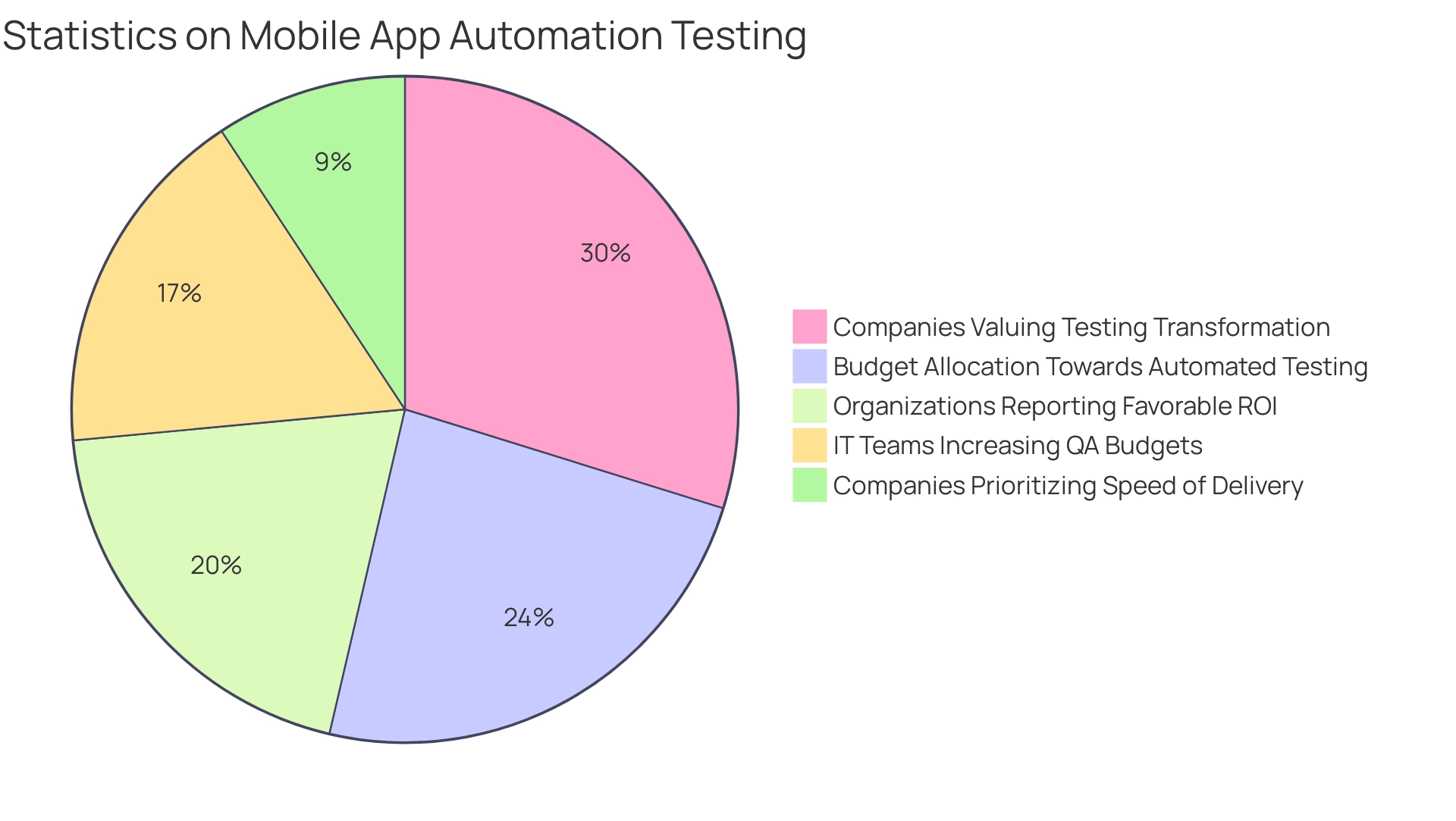
Choosing the Right Tools and Frameworks for Automation
Choosing the appropriate tools for mobile apps automation testing is vital for guaranteeing smooth app functionality and user experience. Key factors to evaluate include:
- Compatibility with your application's platform—whether iOS or Android
- Ease of use
- Community support
- Integration capabilities within your existing development environment
Noteworthy tools in the market for mobile apps automation testing include:
- Appium: Supports a variety of programming languages and platforms, making it a versatile choice.
- Selenium: Commonly acknowledged for web application evaluation, also provides features for mobile apps automation testing.
- Espresso: Specifically tailored for Android settings.
It’s important to acknowledge that 26% of businesses encounter difficulties in choosing the perfect evaluation instrument for their application, highlighting the challenges faced by many organizations. To tackle these challenges, insights from the case study titled "Top Automation Tools for 2024: Boost App Performance" emphasize the increasing significance of mobile apps automation testing tools in the current digital landscape.
To maximize the effectiveness of your assessment strategy, conduct comprehensive evaluations of these tools in relation to your team's expertise and the specific goals of your project. Keerthi Veerappan, a Lead Marketing Strategist, emphasizes the importance of equipping assessment and QA teams with robust mobile apps automation testing tools, stating,
By empowering assessment and QA teams with mobile apps automation testing tools, you can boost pace and reachability.
Such insights emphasize the necessity of selecting the appropriate frameworks to facilitate successful outcomes.
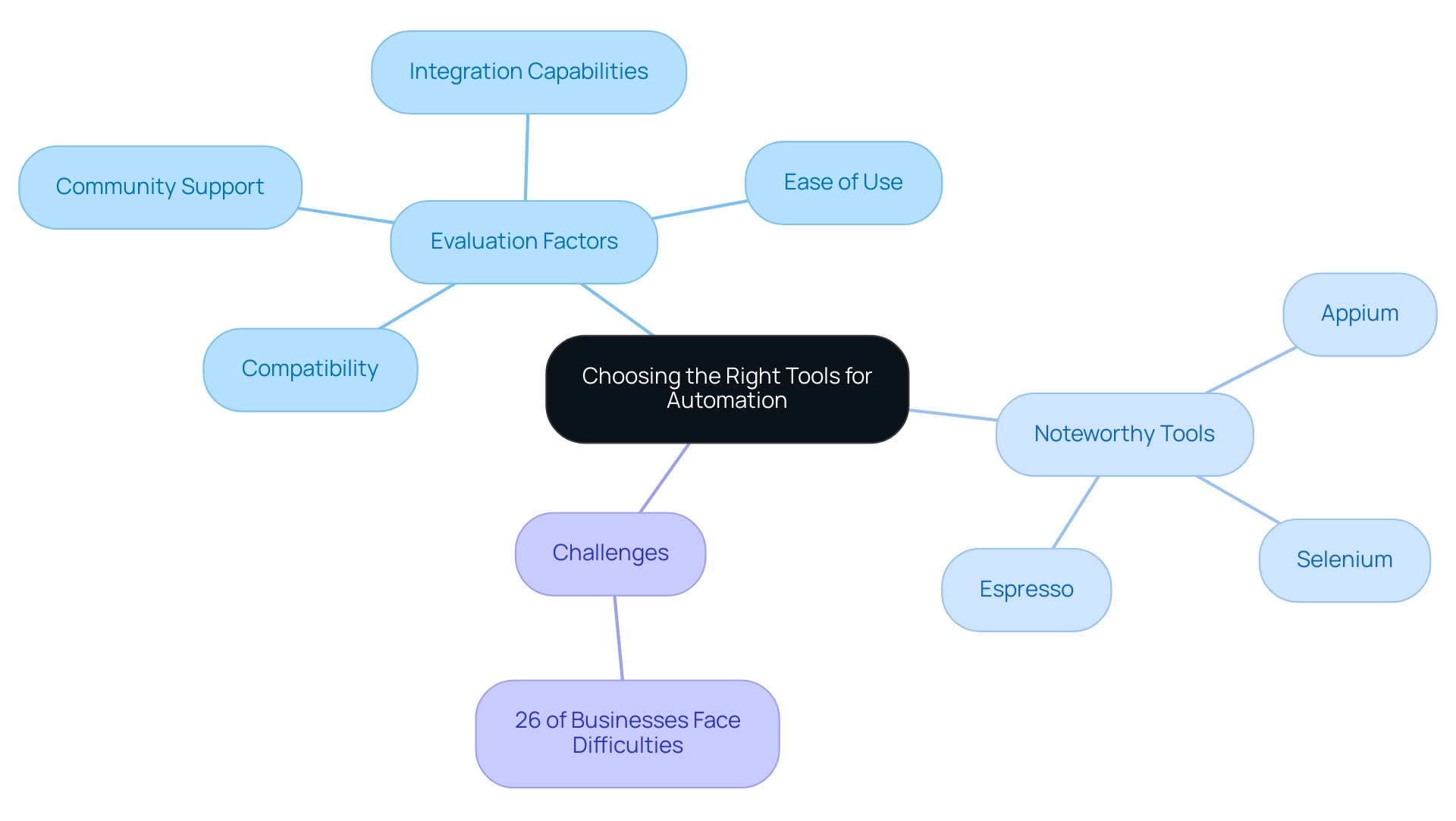
Navigating Challenges in Mobile App Automation Testing
Mobile apps automation testing is fraught with several challenges, most notably device fragmentation. The landscape has evolved, with Android 13's install base experiencing a notable increase from 15% to 22.4%, and the percentage of devices running supported Android versions now at 59.8%. Such diversity can lead to inconsistent app behavior across the multitude of devices and operating system versions.
To mitigate these challenges, enterprises should utilize mobile apps automation testing on 25 or more devices to ensure comprehensive coverage and compatibility. Additionally, security risks are significant, as sensitive data may be exposed during evaluation processes. To effectively navigate these complexities, testers should adopt a robust device strategy.
Utilizing cloud-based evaluation services or device farms can significantly enhance coverage for mobile apps automation testing across a wide range of devices. Jessica Holman, a technical writer, aptly notes,
A device lab is a collection of physical devices—smartphones, tablets, wearables—organized in a specific location where testers can manually test the application across different hardware configurations, operating systems, and network conditions.
Furthermore, adhering to security best practices, such as data anonymization and the application of secure coding techniques, is essential to mitigate potential risks during evaluation.
With the average smartphone user checking their device 47 times a day, ensuring consistent app performance is crucial to meet user expectations, as any inconsistency can lead to user dissatisfaction. Additionally, considering that 80% of users utilize Google Chrome and Mozilla Firefox while many still use other browsers, it is vital for teams to ensure app compatibility across all major browsers to enhance the overall user experience.
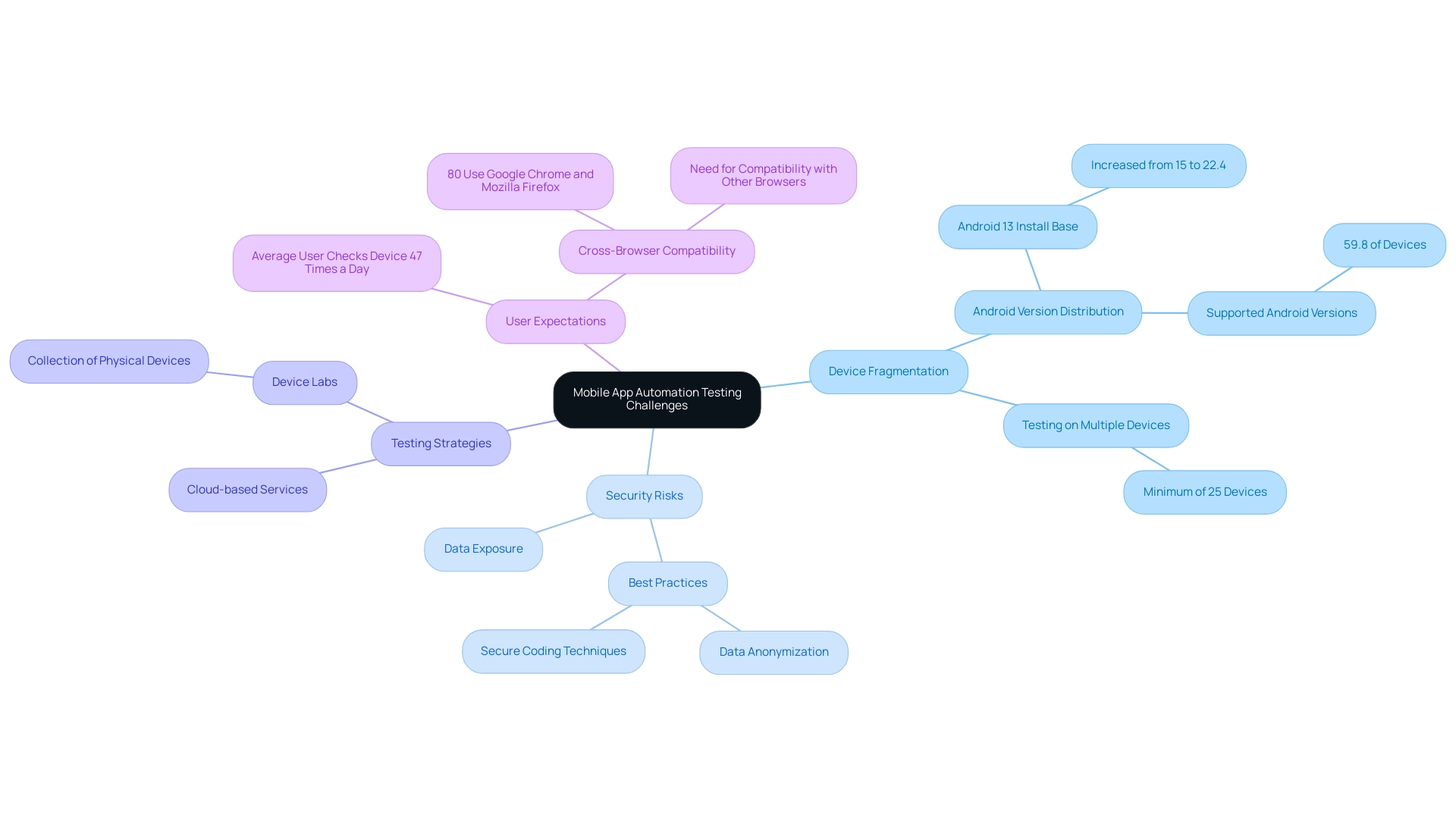
Best Practices for Effective Mobile App Automation Testing
To attain effective mobile apps automation testing, it's essential to apply best practices that not only improve efficiency but also guarantee user satisfaction. Begin by creating a clear systematization strategy that aligns with your project's objectives, thus offering a roadmap for your evaluation efforts. Prioritize test cases for automation based on their frequency and criticality; this approach ensures that the most impactful areas of your application receive the attention they deserve.
Regularly maintaining a robust test suite is essential—review and update test cases to reflect any changes in your application, thereby minimizing the risk of bugs during deployment.
Collaboration between developers and testers is another key factor. Ensuring that the evaluation environment closely mirrors production settings can significantly enhance the accuracy of your tests. Moreover, adopting continuous integration and continuous deployment (CI/CD) practices can enhance the evaluation process and facilitate immediate feedback, allowing for quicker iterations and more dependable releases.
The urgency of these practices is underscored by the fact that 70% of app uninstallations stem from crashes, and equally alarming is that 70% of users will exit an app if it takes too long to launch. This highlights the critical need for effective testing strategies. As noted by Delivery Manager Martin Schneider, "Before BrowserStack, it took eight test engineers a whole day to test.
Now it takes an hour. We can release daily if we wanted to." This illustrates the drastic improvements in efficiency that can be achieved through effective mechanization strategies, which are essential in preventing issues that lead to mobile apps automation testing and app uninstalls.
Given the ongoing fragmentation challenges in app development, with Android 13's install base increasing to 22.4%, it is imperative for developers to ensure compatibility across a diverse range of devices. This compatibility is crucial to maintaining app functionality and user satisfaction, reinforcing the necessity of the best practices discussed.
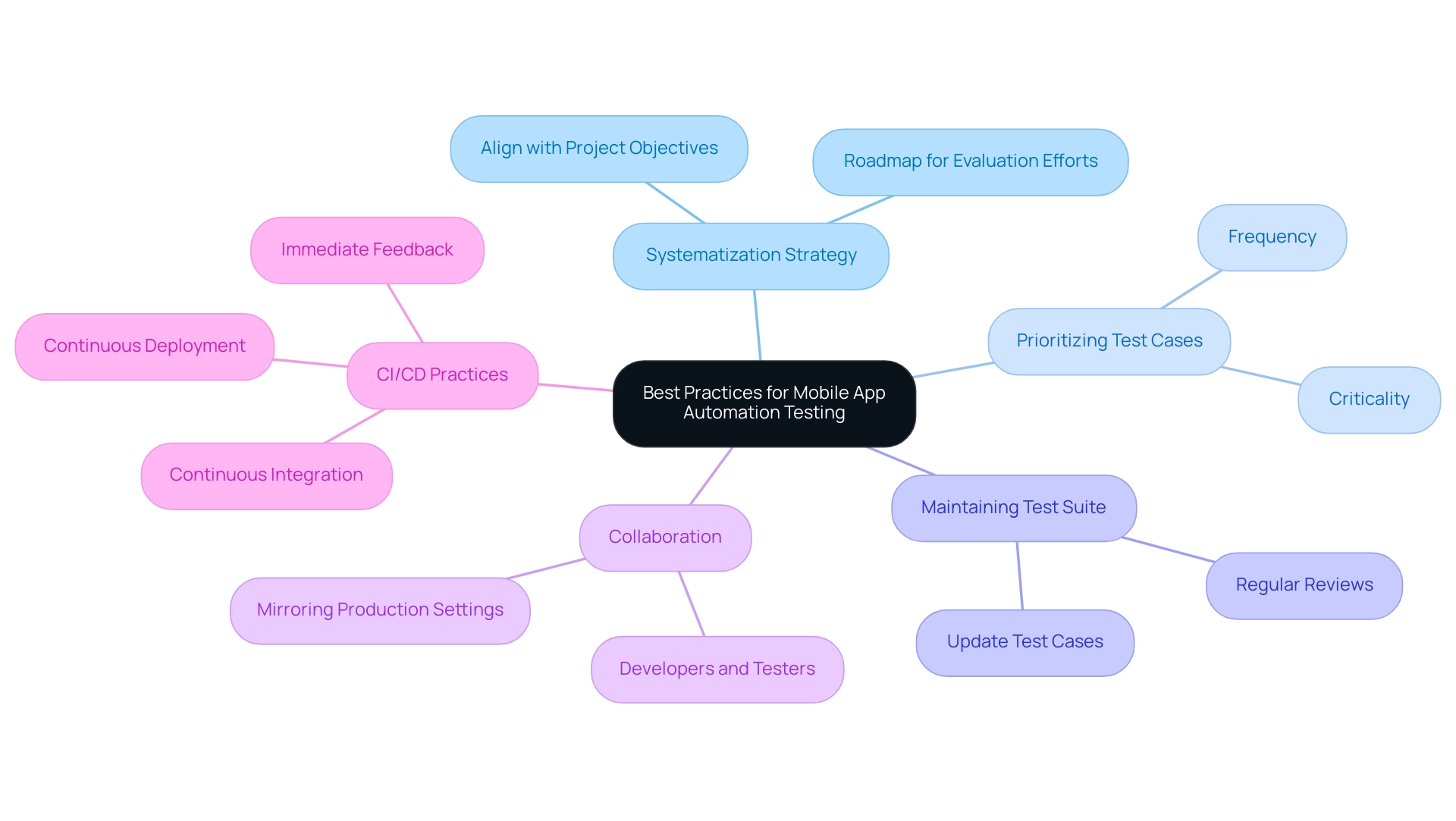
Future Trends in Mobile App Automation Testing
The scenery of application automation assessment is on the verge of transformation, primarily propelled by the integration of artificial intelligence (AI) and machine learning (ML). These technologies are set to improve efficiency significantly by automating repetitive tasks and providing predictive analytics, enabling teams to concentrate on higher-value activities. As billions of users increasingly depend on mobile applications, robust security measures are essential to safeguard sensitive data, emphasizing the critical need for thorough evaluation strategies.
Moreover, the evaluation of audio-video quality is becoming increasingly important for media-centric applications to ensure customer satisfaction. The increase in cloud-based evaluation solutions is allowing organizations to expand their assessment efforts without incurring substantial hardware costs, thus streamlining operations. Furthermore, the adoption of DevOps practices is facilitating a more cohesive collaboration between development and quality assurance teams, which is crucial for expediting the release cycles.
As per industry forecasts, the robotic process automation (RPA) market is anticipated to expand from $3.17 billion in 2022 to $13.39 billion by 2030, highlighting the growing dependence on advanced evaluation methodologies. As Alona O. notes,
Moreover, RPA will become much more intelligent thanks to the advances in artificial intelligence and machine learning soon.
A practical example of this is the 'Hybrid Testing Strategy,' where Global App Testing combines a test management platform with bug and issue trackers to create an integrated approach that ensures comprehensive and efficient mobile apps automation testing.
Organizations must stay vigilant and adapt to these trends to maintain a competitive edge in the dynamic realm of mobile app development.
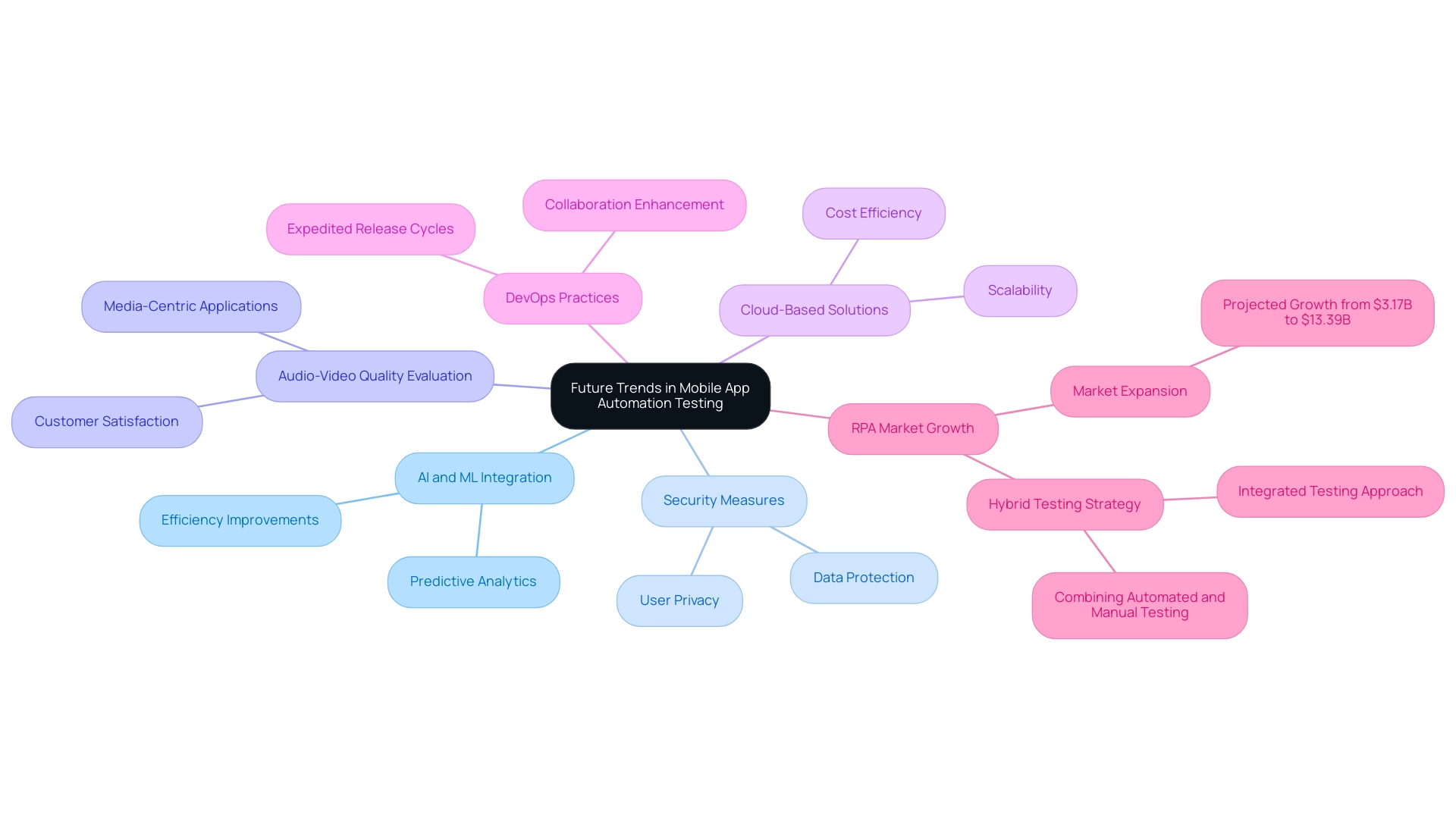
Conclusion
Mobile app automation testing is not just an option; it is an essential component of successful mobile application development in today's fast-paced environment. The article highlights the critical need for automation to enhance the quality, performance, and reliability of apps, demonstrating that a significant percentage of app uninstallations result from crashes. By adopting automation testing, organizations can swiftly identify and resolve issues, thereby improving user satisfaction and reducing development time.
Choosing the right tools for automation is equally vital. With a variety of options available, organizations must evaluate tools based on:
- Compatibility
- Ease of use
- Integration capabilities
This careful selection process, paired with a robust automation strategy, ensures that testing efforts align with project goals and effectively address the challenges posed by device fragmentation and security risks.
As the industry continues to evolve, embracing best practices in automation testing becomes imperative. Collaboration between developers and testers, maintaining a comprehensive test suite, and implementing continuous integration practices can significantly enhance testing efficiency. The future of mobile app automation testing promises to be shaped by advancements in AI and machine learning, which will further streamline testing processes and improve overall app quality.
In conclusion, organizations that prioritize mobile app automation testing will not only meet user expectations but also position themselves for success in an increasingly competitive landscape. By investing in the right tools, adopting effective strategies, and staying attuned to emerging trends, businesses can ensure their mobile applications thrive and deliver exceptional user experiences.





